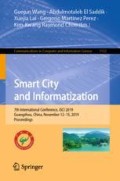Abstract
Energy conservation has become a major bottleneck for wide deployment of Internet of Things (IoT) technologies. This paper presents energy consumption analysis of ZigBee-enabled IoT networks, and shows the primary energy consumption in a node from a practical aspect. Based on the analysis and experimental measurement, this paper proposes an adaptive MAC layer energy-saving algorithm. This algorithm can adaptively configure the MAC layer in each node based on real-time network traffic conditions. The aim is to minimize the power consumption of each node achieving a longer lifetime and better quality of service. In addition, a software and hardware experimental platform has been built up to verify the reliability and effectiveness of the algorithm. The experimental results show that the adaptive MAC layer energy-saving algorithm is effective and efficient in minimizing node energy consumption.
Access this chapter
Tax calculation will be finalised at checkout
Purchases are for personal use only
References
Atzori, L., Iera, A., Morabito, G.: The internet of things: a survey. Comput. Netw. 54(15), 2787–2805 (2010)
Al-Fuqaha, A., Guizani, M., Mohammadi, M., Aledhari, M., Ayyash, M.: Internet of Things: a survey on enabling technologies, protocols, and applications. IEEE Commun. Surv. Tutor. 17(4), 2347–2376 (2015)
Karalis, A., Joannopoulos, J.D., Soljačić, M.: Efficient wireless non-radiative midrange energy transfer. Ann. Phys. 323(1), 34–48 (2008)
Peng, X., Yin, J., Mak, P.I., Yu, W.H., Martins, R.P.: A 2.4-GHZ ZigBee transmitter using a function-reuse class-F DCO-PA and an ADPLL achieving 22.6% (14.5%) system efficiency at 6-dBm (0-dBm) \( P_{out}\). IEEE J. Solid-State Circuits 52(6), 1495–1508 (2017)
El-Hoiydi, A., Decotignie, J.D.: Low power downlink MAC protocols for infrastructure wireless sensor networks. Mob. Netw. Appl. 10(5), 675–690 (2005)
Raghunathan, V., Ganeriwal, S., Srivastava, M.: Emerging techniques for long lived wireless sensor networks. IEEE Commun. Mag. 44(4), 108–114 (2006)
Anchora, L., Capone, A., Mighali, V., Patrono, L., Simone, F.: A novel MAC scheduler to minimize the energy consumption in a wireless sensor network. Ad Hoc Netw. 16, 88–104 (2014)
Alhmiedat, T.: Low-power environmental monitoring system for ZigBee wireless sensor network. KSII Trans. Internet Inf. Syst. 11(10), 4781–4803 (2017)
Pan, M.S., Tseng, Y.C.: Quick convergecast in ZigBee beacon-enabled tree-based wireless sensor networks. Comput. Commun. 31(5), 999–1011 (2008)
Li, S.: Energy consumption optimization method of wireless sensor networks based on ZigBee. Ph.D. thesis, Hunan University (2010)
Zhen, C., Liu, W., Liu, Y., Yan, A.: Energy-efficient sleep/wake scheduling for acoustic localization wireless sensor network node. Int. J. Distrib. Sens. Netw. 10(2), 970524 (2014)
Shun, J.: Research on energy consumption mechanism based on ZigBee network. Ph.D. thesis, Beijing University of Posts and Telecommunications (2015)
Jiang, B.: Research on MAC layer energy-efficient for ZigBee wireless sensor network. Ph.D. thesis, Shanghai Jiao Tong University (2014)
Bai, F.: Research on energy efficiency technology for ZigBee-based wireless sensor network. Ph.D. thesis, National University of Defense Technology (2008)
Gharghan, S., Nordin, R., Ismail, M.: Energy-efficient ZigBee-based wireless sensor network for track bicycle performance monitoring. Sensors 14(8), 15573–15592 (2014)
ZigBee Alliance: ZigBee specification (2019). http://www.zigbee.org
IEEE: IEEE standard for local and metropolitan area networks-part 15.4: low-rate wireless personal area networks (LR-WPANs). IEEE Std 802.15.4-2011 (Revision of IEEE Std 802.15.4-2006), pp. 1–314, September 2011. https://doi.org/10.1109/IEEESTD.2011.6012487
Willig, A.: Recent and emerging topics in wireless industrial communications: a selection. IEEE Trans. Ind. Inform. 4(2), 102–104 (2008)
Acknowledgments
The work in this paper was partly supported by National Natural Science Foundation of China (NSFC) projects (61572389 and 61620106011), and Zhongshan City Team Project (No. 180809162197874).
Author information
Authors and Affiliations
Corresponding author
Editor information
Editors and Affiliations
Rights and permissions
Copyright information
© 2019 Springer Nature Singapore Pte Ltd.
About this paper
Cite this paper
Zhang, Y., Yang, K., Chen, H. (2019). An Adaptive MAC Layer Energy-Saving Algorithm for ZigBee-Enabled IoT Networks. In: Wang, G., El Saddik, A., Lai, X., Martinez Perez, G., Choo, KK. (eds) Smart City and Informatization. iSCI 2019. Communications in Computer and Information Science, vol 1122. Springer, Singapore. https://doi.org/10.1007/978-981-15-1301-5_29
Download citation
DOI: https://doi.org/10.1007/978-981-15-1301-5_29
Published:
Publisher Name: Springer, Singapore
Print ISBN: 978-981-15-1300-8
Online ISBN: 978-981-15-1301-5
eBook Packages: Computer ScienceComputer Science (R0)

